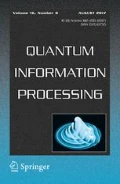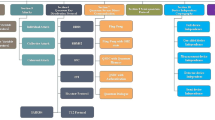Abstract
LWE (learning with errors)-based cryptography, whose security relies on the hardness of the underlying LWE problem, is one of the most promising candidates for post-quantum cryptography that is designed to be secure even when the adversaries can access the quantum computers. The quantum LWE problem is a quantum version of the LWE problem, where the solving algorithm can query the LWE oracle in a quantum way. For this quantum LWE problem, Grilo, Kerenidis and Zijlstra (GKZ) recently showed an efficient quantum solving algorithm, together with a test candidate algorithm which judges whether the solution returned by solving algorithm is correct. In this paper, we first present an improved version of the GKZ solving algorithm, which can support a higher error rate, and meanwhile achieve a higher success probability. In particular, for the high error rate case, our algorithm can almost increase the success probability by a factor q than the original GKZ solving algorithm, where q is the module of the LWE problem. Second, for the GKZ test algorithm, we show a quadratic speed-up in running time by introducing amplitude amplification.



Similar content being viewed by others
Data Availability
Data sharing not applicable to this article as no datasets were generated or analysed during the current study.
Notes
\(k\le \frac{q}{9}\): In Sect. 3.1, we give a detail description.
References
Feynman, R.P.: Simulating physics with computers. Int. J. Theor. Phys. 21(6/7), 467–488 (1982)
Shor, P.W.: Polynomial-time algorithms for prime factorization and discrete logarithms on a quantum computer. SIAM J. Comput. 26(5), 1484–1509 (1997)
Bennett, C.H.: Quantum cryptography: public key distribution and coin tossing. In: Proceedings of IEEE international conference on computers, 175-179 (1984)
Bernstein, D., Buchmann, J., Dahmen, E.: Post Quantum Cryptography. Springer, Berlin, Heidelberg (2009)
Lo, H.K., Chau, H.F.: Unconditional security of quantum key distribution over arbitrarily long distances. Science 283(5410), 2050–2056 (1999)
Brassard, G.: Brief history of quantum cryptography: a personal perspective. IEEE in-formation theory workshop on theory and practice in information theoretic security, 19-23 (2005)
Elliott, C.: Building the quantum network. New J. Phys. 4(46), 1–12 (2002)
Peikert, C.: A decade of lattice cryptography. Found. Trends Theor. Comput. Sci. 10(4), 283–424 (2016)
Regev, O.: On lattices, learning with errors, random linear codes, and cryptography. J. ACM 56(6), 1–40 (2009)
Alagic, G., Jeffery, S., Ozols, M., Poremba, A.: On quantum chosen ciphertext attacks and learning with errors. Cryptography 4(1), 1–27 (2020)
Grilo, A.B., Kerenidis, I., Zijlstra, T.: Learning with errors problem is easy with quantum samples. Phys. Rev. A, 99(3), (2019)
Bernstein, E., Vazirani, U.: Quantum complexity theory. SIAM J. Comput. 26(5), 1411–1473 (1997)
Franco, R.: Quantum amplitude amplification algorithm: an explanation of availability bias. Springer, Berlin, Heidelberg (2009)
Grover, L.K.: A fast quantum mechanical algorithm for database search. In: Proceedings of the twenty-eighth annual ACM symposium on Theory of Computing, 212-219 (1996)
Brassar, G., Hoyer, P., Moscaand, M.: Quantum amplitude amplification and estimation. Quant. Comput. Quant. Inform. 305(5), 53–74 (2002)
Deutsch, D., Jozsa, R.: Rapid solution of problems by quantum computation. Proc. R. Soc. Lond. 439(1907), 553–558 (1992)
Brassard, G., Hoyer, P.: An exact quantum polynomial-time algorithm for simon’s problem. In: Proceedings of the 5th Israeli symposium on theory of computing and systems(ISTCS’97), 12-23 (1997)
Acknowledgements
We would like to thank anonymous reviewers for their insightful comments and suggestions. Haodong Jiang was funded by the National Key R &D Program of China (No. 2021YFB3100100), the National Natural Science Foundation of China (No. 62002385), and China Postdoctoral Science Foundation (No. 2021M703321). Zhi Ma was funded by the National Natural Science Foundation of China (No. 61972413).
Author information
Authors and Affiliations
Corresponding author
Additional information
Publisher's Note
Springer Nature remains neutral with regard to jurisdictional claims in published maps and institutional affiliations.
Rights and permissions
About this article
Cite this article
Wang, Y., Jiang, H., Ma, Z. et al. An improved quantum algorithm for the quantum learning with errors problem. Quantum Inf Process 21, 166 (2022). https://doi.org/10.1007/s11128-022-03507-8
Received:
Accepted:
Published:
DOI: https://doi.org/10.1007/s11128-022-03507-8



